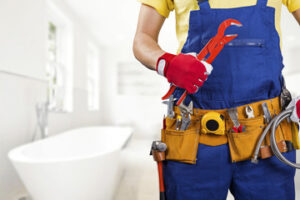Plumber Oceanside CA installs, repairs and maintains plumbing fixtures and systems that carry water, sewage and waste. They often use specialized tools to inspect hard-to-reach places. They are also knowledgeable in following standards and codes.

A plumber will inspect all visible water supply lines for leaks, corrosion, breaks, kinks and signs of rust. They will test water pressure at all fixtures like sinks, showerheads and toilets and check drainage flow rates.
Plumbing systems include pipes that distribute water and remove waste, as well as fixtures like toilets, showers, and sinks. Plumbers install these systems in homes and businesses, following blueprints and building codes to ensure the correct placement and connections of components. This work requires attention to detail and dexterity to maneuver tools. Plumbers also use specialized equipment to inspect pipes for leaks and other problems. They must be able to identify the source of a problem and find a solution quickly and efficiently.
While a high school diploma is sufficient for entry into most skilled trades, becoming a plumber usually requires completion of an apprenticeship. Apprenticeships last two to five years and involve on-the-job training under a master plumber. After completing an apprenticeship, candidates must pass a state exam to receive their license.
In addition to repairing leaks and installing new fixtures, plumbers also connect gas lines and test septic systems. These tasks require a thorough understanding of local and national building codes, as well as the ability to read blueprints. Plumbers often work with other professionals to complete construction projects, including builders, electricians, and carpenters.
A plumber may specialize in residential or commercial work. Commercial plumbers handle larger plumbing systems, such as those found in hospitals and large office buildings. They may also be responsible for maintaining and repairing large boilers that supply heat to buildings. Residential plumbers handle smaller systems, such as those found in homes and apartments.
Both types of plumbers must be able to work with a wide range of materials. They must be familiar with copper, steel, and plastic pipes, as well as a variety of fittings and valves. Plumbers must be able to identify the type of material required for a particular job and select the appropriate pipe size, thickness, and shape. They must also be able to follow blueprints and read meters to lay out pipe routes accurately.
In order to avoid costly mistakes, it’s important for plumbers to have strong analytical skills and be able to think on their feet. They often work with hazardous materials, so it’s important to know how to handle them safely. Plumbers must also be able to identify the location of shut-off valves and understand how to turn them off in an emergency.
Repair
A plumbing system is essential to the comfort and safety of a home or business. If there are problems with the pipes, such as leaks or clogs, they need to be repaired quickly to prevent damage and minimize disruption. Plumbers use a variety of repair techniques to resolve issues, including relining and replacement.
Leaking pipes can lead to expensive water bills and property damage. If left untreated, leaking pipes can also cause mold and mildew. To avoid costly repairs, it is important to regularly inspect your plumbing fixtures and pipes for signs of wear and tear, such as rust or water stains. By identifying and addressing these issues early, you can protect your pipes from damage and reduce your water bill.
A common plumbing problem is a clogged drain or sewer line. When a drain becomes clogged, it can affect multiple fixtures throughout the home. In severe cases, a clogged line can cause raw sewage to back up into toilets and bathtubs. To resolve this issue, a plumber can insert a camera into the sewer line to locate the source of the clog and determine the best course of action.
In some cases, a plumber may need to replace the entire pipe. This is typically done when the pipes are old or damaged. A plumber will remove the damaged section of the pipe and install new piping, using materials such as PVC or PEX. Plumbers must be skilled in pipe replacement to ensure that the new pipes are properly installed and secure in place.
While it is possible to do some maintenance tasks yourself, such as cleaning out your drain traps and keeping an eye on water pressure, it’s best to leave plumbing repairs and installations to professional plumbers. A professional plumber will have the experience and tools necessary to fix problems quickly and efficiently.
A plumbing system is complex and requires regular inspections and maintenance to keep it in good condition. By being aware of the basics of how your plumbing system works, you can take steps to reduce the risk of emergency problems and keep it running smoothly for years to come.
Inspection
A plumbing inspection is a key part of a plumber’s job. This ensures that the system is safe and functional, which gives building owners peace of mind. It also helps identify potential problems, allowing them to be addressed through minor repairs rather than major replacements down the road.
During an inspection, a plumber will note the location and type of fixtures, examine all piping to verify proper materials and connections, and test water pressure to make sure it’s within the range recommended by manufacturers. They’ll also check for corrosion, mineral deposits, leaks and other issues that could affect the safety and efficiency of the system.
The plumber may also inspect drains, vents and waste systems for clogs and obstructions. They’ll look for gurgling noises, which may indicate problems with the waste disposal system. They’ll also check for reduced water flow, which can indicate a clog or other issue with the supply lines. Additionally, the plumber will check for proper slope of drain lines and confirm all vents are clear.
Plumbers must also understand the physics of water and how it flows through pipes. They’ll use this knowledge to troubleshoot and repair plumbing problems. This is important because incorrectly installed piping can cause flooding, water damage and other serious problems.
A plumber may also need to be knowledgeable about building codes and regulations. They’ll interpret blueprints and plans to ensure the installation of new piping is correct and in compliance with local laws. They’ll also be responsible for obtaining the necessary permits and conducting inspections.
Soft skills play an important role in the skilled trades, especially when interacting with customers. The ability to communicate clearly and provide recommendations is essential. In addition, the plumbing industry requires teamwork and collaboration to install and maintain large commercial and residential plumbing projects. If you’re interested in becoming a plumber, it’s important to start with a high school diploma or alternative accreditation and find an apprenticeship program that can teach you the skills needed for this career. The length of an apprenticeship varies, but can last up to five years.
Maintenance
Keeping plumbing systems functioning properly is crucial to the health and safety of building occupants. Whether it’s an issue as small as a dripping faucet or as large as a burst pipe, plumbers are on call 24/7 to fix problems when they arise. This work can be stressful and physically demanding, so it’s important for plumbers to maintain a healthy lifestyle by eating well, exercising regularly, and getting enough sleep.
The work environment for plumbers varies depending on the type of plumbing they do. For example, residential plumbers typically work in homes and apartments and focus on installing and repairing pipes, fixtures, and appliances like sinks, toilets, and water heaters. These plumbers often work in tight spaces and must navigate around furniture, toys, and other household items when performing their tasks. They also frequently interact with customers, providing advice and recommendations, and answering questions.
Commercial plumbers, on the other hand, work in larger settings such as office buildings, retail stores, and hospitals. These plumbers are responsible for the installation and maintenance of larger scale plumbing systems, including sewage and waste disposal systems, and may use more complex tools to repair and diagnose issues. They also work with engineers and construction teams to ensure that plumbing systems are integrated seamlessly into building projects.
All plumbers must have excellent problem-solving skills to identify and resolve issues quickly and efficiently. They must also be comfortable working with their hands and using hand tools to open and shut valves and pipes. They must also be able to follow instructions and blueprints precisely when installing new plumbing systems. Additionally, plumbing is a highly technical profession that requires ongoing learning to stay current with industry trends and regulations.
For homeowners, regular plumbing maintenance is an easy way to help prevent expensive repairs in the future. To do this, you can reduce your chances of a leak by checking for visible signs of leaks (such as water spots and stains), ensuring that all faucets are turned off completely, and minimizing what goes down the drains (like food scraps, grease, and hair). You can also save money by having a professional plumber inspect and service your plumbing system at least once every five years.
